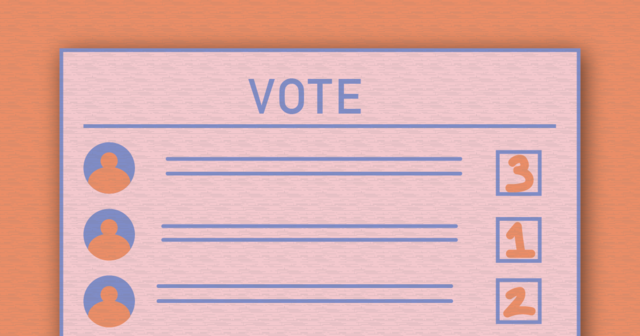The way of voting during elections in the United States has been most commonly known as voting for one candidate. While this way of voting has been going on for decades, many voters are now seeing the problems that arise in this style of voting and are pushing for the ranked choice voting style.
RCV not only lets voters choose more than one candidate for the elections, but it also allows voters to rank candidates in order of preference. This style of voting solves two major issues that elections face: spoiler candidates and vote splitting.
“Today’s style of voting not only prevents voters from supporting the ‘underdog candidate’ and essentially ‘throwing away your ballot’ but also pressures voters to vote for the ‘lesser of two evils,’” according to Rank MI Vote.
Dr. Kevin Deegan-Krause, an associate professor of political science at Wayne State University, said that RCV is a simple and powerful change to the way Michigan elects its leaders that allows more choice and voices.
“It’s a different way of choosing our leaders that allows people to express not just yes or no, but actually allow voters to do what’s in their minds already and go ‘I like this candidate first, I like this candidate second, I like this candidate third,’” Krause said.
When Krause first started teaching 20 years ago, RCV was not a familiar idea, however, many states are now pushing for the new way of voting. As of 2020, Maine has been the only state so far to implement RCV style voting at the state level. Currently in Michigan, as of 2019, Eastpointe is the only city to have adopted RCV style voting, while Ferndale has adopted RCV but not yet implemented the change.
“[Ranked voting] has started to become the new norm, at least it’s starting to become an option that people are familiar with. When I first started teaching about this 20 years ago I would bring this up and my students would look at me like I was from space. These days people are starting to know about this and have an inkling of how it works,” Krause said.
Michigan currently has a building movement in support of RCV. The non-partisan, politically diverse, non-profit organization, Rank MI Vote, is dedicated to educating and advocating for the Michigan public about RCV.
“With RCV, your vote stays in play until one candidate wins with a majority — more than 50% of the vote. If used for Michigan elections, Ranked Choice Voting would bring more voices and choices into our political process and ensure outcomes that more accurately reflect the will of the voters,” according to rankmivote.org.
RCV style of voting brings many benefits to voters including the elimination of spoiler ballots, promoting diverse candidates and curbs negative campaigning. However, there are still some cons that can come from RCV style of voting. Petra Hendrickson, assistant professor of political science at NMU, said that there’s still the chance for some disproportionality in election results.
“Because ranked choice voting occurs in single-member districts, there’s still the chance for some disproportionality in election results, where the winning party overall has far more seats than their national vote total would suggest,” Hendrickson said. “There’s also a fair amount of literacy and numeracy involved from the voter’s perspective to understand what’s happening to their votes, and the votes themselves would become more complicated, and perhaps, to tally, as votes would have to be re-allocated as candidates are eliminated.”
With the upcoming election, Hendrickson said that first time voters should understand who and what they are voting for. Hendrickson said that you should vote not just for national offices, but for state and local offices too, since most governance actually occurs at the local level.
“The most important thing is to vote, and to vote in a way you find satisfying — don’t let people make you feel ashamed for voting your true preferences, regardless of whether that means voting for a third party,” Hendrickson said. “Third party voters are people who the two main parties haven’t done a good enough job making themselves appealing to, and that’s on the two main parties, not on the individual. So vote, vote your conscience, and vote, perhaps especially, for local positions.”
Anyone who is looking to educate themselves more in the topic of ranked choice voting, whether a student or community member, can look into the upcoming virtual event presented by Rank MI Vote on October 28 at 7 p.m. This event will be presented by Kevin Deegan-Krause and discuss rank choice voting as a whole and the advantages it brings. More information about the event can be found at: https://www.marquette365.com/event/rank-mi-vote-town-hall-4/






























